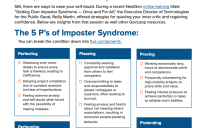![]()
As a millennial, I value the flexibility that telework can provide. However, most government organizations don’t offer this option to their employees.
If we live in a world where technology is growing at an insurmountable pace, why does our workplace still look like it did in the 1950’s? We’ve moved from typewriters to computers and that’s really about it. Why are organizations not making better use of mobile devices and laptops? After all, these gadgets were created to give us mobility. While some jobs absolutely require a central office space because of the nature of their work, those that can be done from just about anywhere should be doing just that. A survey done by ConnectSolutions said that of those who work remotely at least a few times per month, 77 percent reported greater productivity while working offsite; 30 percent said they accomplished more in less time and 24 percent said they accomplished more in the same amount of time. But why are some managers so against this practice, specifically for millennials? I think the answer can be summarized in a conversation I overheard at the metro one day:
Seasoned Professional 1: So my employees keep requesting telework and I just don’t agree with that practice.
Seasoned Professional 2: I hear you, I wouldn’t let my employees telework either; how do you know they are working? These young people have so many distractions nowadays; they could be doing anything but work.
As I mentally rolled my eyes at this conversation, I realized that the millennial/telework dilemma usually comes down to one thing: trust. It seems some managers don’t trust that their employees are actually working while telecommuting. Yes, we do have a lot more distractions than previous generations, but this does not prevent us from doing our jobs and delivering great results. So what can mangers do to embrace a culture of teleworking and allow their Millennial workforce the flexibility they so desperately look for?
1. Address the elephant in the room.
Have an open and honest discussion with your millennial workforce, or really with your whole workforce, and address concerns; ask questions and set expectations and goals. The only way to address those trust issues is by putting your concerns out there and finding ways to mitigate them. Managers should work with their employees to set job performance expectations and daily task goals.
2. Start small.
Start with one day of telework a week and see how that goes with your employees. Develop a schedule that allows a small group of your team to telework once a week. Measure productivity and engagement within this telework group by conducting short surveys or interviews. Assess whether tasks and deliverables were completed faster or within the expected deadlines. You can call this your telework pilot program.
3. Communication, communication, communication.
Continuous communication with your team is key to making your telework pilot a success. Make sure that you are providing feedback to your telework employees on their performance and that you are addressing concerns and issues as a team. A practice that may help with trust is asking your employees to send a short list or summary of the tasks they worked during their telework day.
It’s time we start embracing a culture of telework or at the very least start having those conversations. These are all best practices which should apply even to staff in the office. We already have the technology that can enable us to telework, what we need now is the support and trust from our managers to move from taboo to can-do!
Michelle Rosa is part of the GovLoop Featured Blogger program, where we feature blog posts by government voices from all across the country (and world!). To see more Featured Blogger posts, click here.





Hi Michelle, I really enjoyed your post, and I couldn’t agree more. I have been very fortunate to work for organizations that allow teleworking, and that has made all the difference for me, especially when my daughter was young.
When I am really busy, I prefer to telework because it cuts down on the time I waste getting dressed up and commuting.
It’s funny that we seemed to be on the same wavelength. My post for last week was also on telecommuting: https://www.govloop.com/community/blog/lessons-learned-multigenerational-conversation-teleworking/
Here’s the essential problem with your argument: its only half the equation. Telework may be fantastic, even preferable, for the Millennial. But the audience you’re aiming this at remembers when phones had cords. What you dont address is whether we want the telecommute, or whether we want you face to face because we dont want to talk to a computer screen. I personally hate phones, and would much rather talk to someone in person, and by doing so make a personal connection.
The Millennial generation has been accused of being entitled, and that may be an unfair generalization, but this article is about what you want from us for your happiness. But – wait for it – when I was your age I didn’t tell my employers what they had to do to make me happy. Because the obvious answer was “I’m paying you. Happy?”
I’m not arguing against telework, nor am I saying that those of us who remember the Soviet Union are incapable of working in a modern digital office. I personally like the idea of not having a physical commute, and a blizzard just means working from home. There are benefits to the concept. But I think you’re only looking at this from only one perspective, and you’re not being fair to the seasoned professional:
Seasoned Professional 1: So my employees keep requesting telework and I just don’t agree with that practice.
Seasoned Professional 2: I hear you, I wouldn’t let my employees telework either; network security is vital these days. I talked to the IT guys, they said they could make it work, but it would add risks. So, I made the decision to keep everything in-house.
Seasoned Professional 1: Yeah, exactly. Deciding to have remote access isn’t like whether or not to have Casual Friday. What if the remote computer is hacked and used as a back door? IT can nail down our LAN, but how secure is a laptop connected to a Starbucks WiFi? A data breach could wreck the whole business, hackers get into our HR files, you’re looking at Social Security numbers for sale, and lawsuits from your employees because you lost all their personal info to some punk in a Guy Fawkes mask. I know other companies do it, but you know, I just decided it wasn’t worth the hassle.
Seasoned Professional 2: Well, that’s what they pay us for, isn’t it?